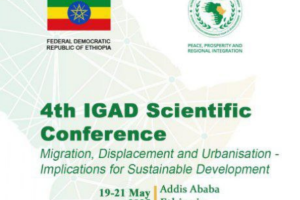
BY YESUF ENDRIS
Money and power has mainly been the driving behind Africa’s ugliest and bloodiest conflicts that continue to date. The Horn of Africa is no different. For decades, the region has been rocked by civil wars and conflicts. Lack of good governance has also been leading to public grievances resulting in chaos and unrest.
Despite little headways, from South Sudan to Somalia, the region has been marred with protracted and bloody wars, the threat has reached fever pitch with border tensions emerging between Ethiopia and Sudan and tensions growing between Kenya and Somalia on contested land.
The Crisis Group in its latest report reviewing the Horn Politics also revealed that regional conflicts and crisis are threatening the region this year.
Amidst all those complications of regional politics, most countries of the region are struggling with internal crisis. The Sudanese for instance is on huge identity-based armed conflict particularly around Darfur, western province of the state. Demonstrators have taken to the street to demand civilian administration but the military wing have rejected the internal recommendations including from (professional associations) while colluding with external ventures.
The country is yet to reel from the popular unrest that brought former president Al-Bashir’s regime into demise. As neighboring country and center of geopolitics of the Horn, Ethiopia has had played a fundamental role in stabilizing the transitional government of Sudan since the removal of the former leader from power.
If it was not the help of Ethiopia, the civilian and military administrations would not have made peace and worked together. Ethiopia in fact has been a helping hand in ensuring peace and tranquility in Sudan. The country has also been playing a leading role in pacifying warn-torn areas in Sudan including Darfur by deploying peacekeeping force as part of the UN Mission. In a move that ruptured the amicable relation between Addis Ababa and Khartoum, Sudan has been pushing for hawkish policy towards Ethiopia though the latter wants peaceful resolution to the border conflict. Sudanese actions have been drawing sharp rebuke from experts who fear a full-scale war could destabilize the region unless swift measures are taken.
In exclusive interview with The Ethiopian Herald, Tagesse Chafo, Speaker of the Parliament has criticized the Sudanese administration for undermining Ethiopia’s years of cooperation and genuine support to the people of Sudan and government. The speaker stated that the Ethiopian government has diligently played a positive role in helping conflicting parties in Sudan reaching conciliatory gesture and middle ground through peaceful means.
Besides the strong people to people relation and the shared values of the two countries, Tagesse said that Prime Minister Abiy Ahmed and his envoy and diplomats have contributed share in helping the transitional government of Sudan stand on its two feet. Sudan has long been one of Ethiopia’s strong allies in many social, economic and political spheres.
However, he denounced Sudanese administration’ recent action and its invasion of Ethiopia border calling it a ‘serious aggression and an act of foolishness.’
The stance taken by Sudanese current administration is likely to inflame regional unrests with all troops mobilization and show of forces.
Ethiopia, for several times, has asked the Sudanese military to return back to Sudan sovereign territory as it calls for status quo be respected. So far, Sudanese forces have resulted in people’s death and property destruction.
In fact, the Sudanese army has clearly declared that it has occupied the land though denied the allegation behind the killing of innocents in other parts of Ethiopia the Sudanese military is visibly violating the Exchange of Notes deal signed by then-leaders of Ethiopia and Sudan in 1972.
The AU and IGAD have tried to settle all those disputes by facilitating all parties in several times. Nevertheless, most of conflicts are still not resolved with conspiracies and third party involvement escalating the tension.
Mukerem Miftah (Ph.D.) is Policy Studies Lecturer at Civil Service University and Regional Politics Analyst. He has years of experience in analyzing the Sudanese politics too. Talking The Ethiopian Herald lately, he said that the current diplomatic situation between Ethiopia and Sudan is entering into critical stage and reaching tipping point.
To him, the main goal of the Sudanese ‘kleptocracy’ is seemingly to garner sentimental support from all corners of Sudan by creating common enemy to all citizens.
“Egypt and Sudan have disputes on their shared border which covers more than 20 thousand square kilometers (in Halib Triangle, where the Egyptian government deployed its soldiers) which is far significant compared to the Ethio-Sudan’s one.”
Noting, the “reality is Ethio-Sudan border dispute is much insignificant compared to the contestation between Sudan-Egypt on contested land, he said.
Briefing the root cause, he indicated that the military wing of the Sudanese administration has dominated the current administration of the country, has been using the Ethio-Sudan border dispute to regain public acceptance as public grievances continues towards the military administration.
Sudan has long been under historical and long-rooted identity based and political crisis which led to public grievances against administrations of different times. And, the major reason why Sudan is consistently flipping upside down is absence strong civilian-administration. “The military factions of the administration are always more concerned about their personal gains and hegemony indeed.”
The Egyptian government has unlawfully occupied large area bordering Sudan in Halaib Triangle by deploying its troops since the dispute started, he said. This shows that Sudan’s recent illegal action in the Ethio-Sudan border is not about land; it is about diverting public attention and making illegal profits, he added.
In Sudan, there are still active and longtime problems relating to identity, justice, power and resource distribution so, the current administration led by the military wing in cooperation with other external forces is using Ethio-Sudan border tension to galvanize national sentiment and divert the intention of the people of Sudan, he said.
Following the independence of Sudan, the influence of Egypt on Sudan’s politics has been high, the impact complicated Sudanese domestic and external relations though.
“Perhaps, Egypt is sowing discord and stoking violence in the border dispute by backing Sudan’s military wing militarily and financing key authorities,” he noted.
The Ethiopian Herald 20 March 2021




